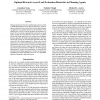1176 search results - page 4 / 236 » Sparse reward processes |
108
click to vote
ICML
2009
IEEE
16 years 14 days ago
2009
IEEE
We consider a sequential decision problem where the rewards are generated by a piecewise-stationary distribution. However, the different reward distributions are unknown and may c...
CORR
2011
Springer
14 years 6 months ago
2011
Springer
We consider finite horizon Markov decision processes under performance measures that involve both the mean and the variance of the cumulative reward. We show that either randomiz...
103
click to vote
ICRA
2010
IEEE
14 years 10 months ago
2010
IEEE
Abstract— Reinforcement learning algorithms have been successfully applied in robotics to learn how to solve tasks based on reward signals obtained during task execution. These r...
AAAI
2011
13 years 11 months ago
2011
Planning agents often lack the computational resources needed to build full planning trees for their environments. Agent designers commonly overcome this finite-horizon approxima...
104
click to vote
ICML
2004
IEEE
16 years 14 days ago
2004
IEEE
We consider learning in a Markov decision process where we are not explicitly given a reward function, but where instead we can observe an expert demonstrating the task that we wa...

